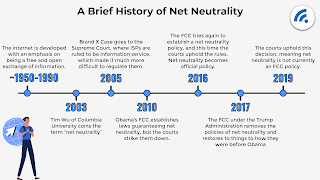Net Neutrality, in the simplest terms, is a concept that allows everybody to have equal access to the internet and equal connection quality. It became illegal to favor Google over Bing by throttling Bing's connection, just as an example. Net Neutrality was introduced in the mid 2010s by then president Barack Obama. The enforcement of Net Neutrality would be overseen by the Federal Communications Commission, or FCC, which means that ISPs would report to them in the event that they were caught committing one of these acts that are now crimes. However, with the help of one man, this would not last very long.
As I mentioned, the government agency tasked with overseeing the ISPs and their decisions is the FCC. In 2017, the agency needed a new chair. At this time, Donald Trump had recently been elected, and he chose to elect Ajit Pai for the role. Ajit Pai is an individual very much against Net Neutrality as it was implemented in 2015. Part of this may or may not be because he worked as a lawyer for Verizon for 2 years (no bias here of course). He had every intention to return the internet back to what it was in the 1990s. Naturally, anyone with an understanding of net neutrality immediately spoke out against it. Two of these people are Vint Cerf and Tim Berners-Lee. Cerf is considered the "father of the internet" and Berners-Lee, the inventor of the World Wide Web. They claimed that the decisions being made were based within a misunderstanding of the internet itself. Unfortunately, none of it mattered, as Pai and the FCC rolled back regulations put in place by the Obama Administration and gave a boat load of power to the ISPs to regulate themselves, which obviously doesn't mean anything because the ISPs have free reign to throttle connections to make more money.As we look at the internet today, we no longer have the protections of Net Neutrality as we know them today. We do have some, very minor restrictions, but as it stands, there are no laws preventing the financially biased internet that people are afraid of, other than the ISPs regulating themselves. The best thing we can do is wait for the discussion of Net Neutrality to return to the forefront of conversation and take an opportunity to bring it back to what it was. We have seen ISPs do sinister things to benefit themselves, and this is one of those things that the government can prevent. Yes, it can be considered prior restraint, but this is more of a gray area than anything else in terms of prior restraint vs. subsequent punishment, especially considering the fact that the ISPs were not exactly getting punished for their actions in most cases (there are a few examples, but most fly under the radar).





No comments:
Post a Comment